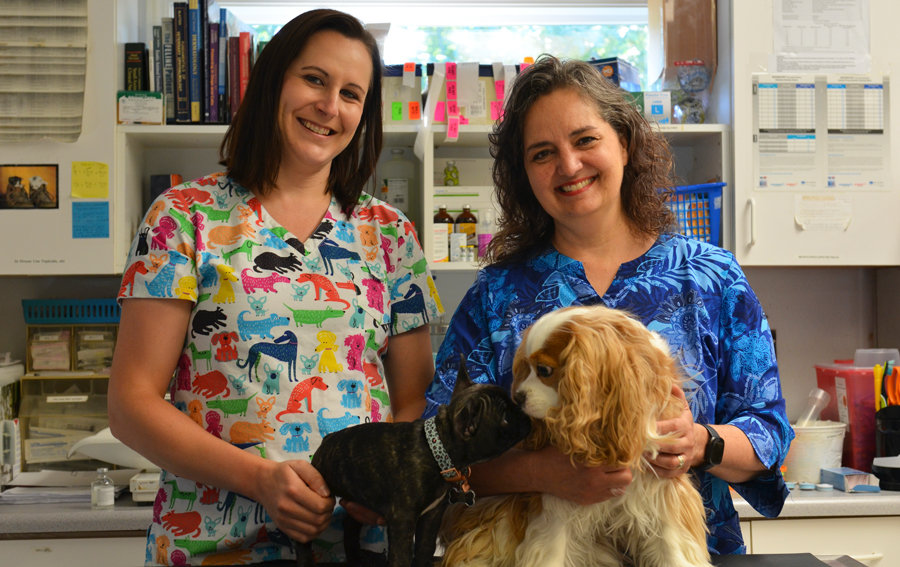
Brookside Veterinary Hospital, owned and operated by Dr. Lisa Woods for nearly 30 years, has survived over a year of Covid protocols and restrictions. Brookside has been busier than ever and a second veterinarian, Dr. Justine Zingsheim-Nadeau (“Zing-shime Nedd-oh”), who graduated from Michigan State University’s College of Veterinary Medicine in May 2013, recently joined the practice.
In April 2021, Zingsheim-Nadeau and her husband Michael Nadeau, who has a background in wildlife management, purchased the hospital.
“We’d been talking about purchasing a practice at some point and it happened a lot faster than we initially thought it would,” she said. “We fell in love with the culture and the family environment Lisa has created here. The staff is absolutely amazing. They put their heart and soul into everything they do.”
At the start of the pandemic, Woods had trouble getting gloves, masks and medical supplies she needed, but sick pets kept coming.
“It’s been a challenge,” she said. “We’ve been here through the thick of it on the front lines, just like the human side, but we haven’t gotten much credit for being on the front lines.”
Staying on top of an increased caseload while keeping clients and staff safe left little time outside of work.
“I literally have been going to home, to work, to home, to work, and no life, just back and forth for a year and a half,” Woods said. “But I did that because I wanted to make sure we were here for the community.”
Brookside’s Covid protocol requires owners to wait outside during appointments, aside from first-time visits. Everyone inside the building is masked. A sign outside instructs visitors to call the front desk upon arrival and Brookside staff bring pets into the clinic.
“Pet adoptions have been way higher than they ever were in the past,” Zingsheim-Nadeau said. “We’ve become actually much busier, with people being at home and being around their pets more to notice small things they may have missed before. It’s been a bit rough, I think, on the field in general.”
Woods said Brookside’s clients, for the most part, have been supportive.
“ERs are booked four to six hours out, so when people come here and we’re running 15 to 20 minutes behind, that’s actually really good,” she said. “But I used to never run behind, so some people are used to me being on time, but it’s a lot harder when you’re trying to do it with the Covid regulations.”
Zingsheim-Nadeau relocated to Port Orchard in 2016. Prior to Brookside, she worked at Ridgetop Animal Hospital in Silverdale while Michael managed Kitsap Veterinary Hospital.
“I’ve joked with them that I feel like I gave birth to this, raised it up to college level, and now I’m passing my college child on to them so they can take it to the next level,” said Woods, who was 24 years old when she finished veterinary school and 28 when she started Brookside in 1994.
“It’s a very stressful profession,” she said. “The veterinary profession has the number one rate of suicide among professionals and burnout is really high. We’re expected to be pouring out and pouring out all the time, and most every one of us that has ever gotten into this, we have a heart for what we do, so we pour out. But an empty vessel can’t pour out very much.”
The reasons behind suicides in the veterinary profession are complex, with theories including emotional stress, fatigue, frequent exposure to death, perfectionism, financial difficulties and access to lethal drugs.
“Sometimes people can be a little harsh to us. That’s what’s sad,” Woods said. “There are a lot of keyboard warriors who take out their aggression behind the keyboard and they really don’t know what a day in the life is like. And words hurt. I’ve had classmates and local associates — they’re gone.”
Zingsheim-Nadeau said the hardest part of her job has always been when she tries her absolute best, doing everything in her power that she was taught to do, but can’t save the animal. Even veterinary success stories can have a dark side — she once treated a pit bull mix with a mass above her eyes who had been found abandoned with her bed and food.
“They took her in, they rescued her, they had the surgery to remove it,” she said. “To watch her recover into a new family that loved her was super awesome.”
Woods looks forward to having “a little freedom to have a life beyond veterinary medicine” now that she is no longer the business owner.
“I’m tired, but I love veterinary medicine,” she said. “I don’t have any intention of retiring in the next 10 to 15 years, but maybe just work less because I’ve been working an awful lot of hours.”
UNDERWRITTEN BY THE FUND FOR NONPROFIT NEWS (NEWSMATCH) AT THE MIAMI FOUNDATION, THE ANGEL GUILD, ADVERTISERS, DONORS AND PEOPLE WHO SUPPORT INDEPENDENT, NONPROFIT LOCAL NEWS